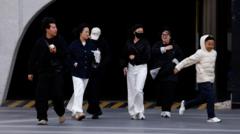Hundreds of flights and train services in and around Beijing faced significant disruptions this weekend due to unprecedented high winds, with gusts reaching up to 93mph (150 kph), the strongest recorded in over 50 years. By early Saturday, a staggering 838 flights had been canceled across the city's two major airports, as state media urged citizens to remain indoors for safety.
The winds originate from a cold vortex system over Mongolia and are forecasted to persist throughout the weekend. This has led to the suspension of numerous train services, including express routes and select high-speed rail lines, compounding the woes for stranded travelers. Parks and historic sites have also closed their doors, with authorities taking preventive measures such as reinforcing older trees. Despite these precautions, reports indicate that nearly 300 trees succumbed to the force of the wind in Beijing.
Local residents expressed a heightened sense of caution, with one individual noting that the streets were unusually empty, reflecting widespread compliance with government advisories to avoid unnecessary movement. The situation proved particularly challenging for those traveling; one businessman from Zhejiang found himself unable to return home after his flights were grounded.
The winds have prompted an orange alert—the first issue of this kind in a decade—indicating potentially severe conditions ahead. According to the China Meteorological Administration, the current wind speeds fall into the 11 to 13 range of their measurement scale, where levels exceeding 11 are linked to significant physical destruction. Authorities expect conditions to ameliorate on Sunday, although vigilant measures remain in effect across the city.
The winds originate from a cold vortex system over Mongolia and are forecasted to persist throughout the weekend. This has led to the suspension of numerous train services, including express routes and select high-speed rail lines, compounding the woes for stranded travelers. Parks and historic sites have also closed their doors, with authorities taking preventive measures such as reinforcing older trees. Despite these precautions, reports indicate that nearly 300 trees succumbed to the force of the wind in Beijing.
Local residents expressed a heightened sense of caution, with one individual noting that the streets were unusually empty, reflecting widespread compliance with government advisories to avoid unnecessary movement. The situation proved particularly challenging for those traveling; one businessman from Zhejiang found himself unable to return home after his flights were grounded.
The winds have prompted an orange alert—the first issue of this kind in a decade—indicating potentially severe conditions ahead. According to the China Meteorological Administration, the current wind speeds fall into the 11 to 13 range of their measurement scale, where levels exceeding 11 are linked to significant physical destruction. Authorities expect conditions to ameliorate on Sunday, although vigilant measures remain in effect across the city.


















